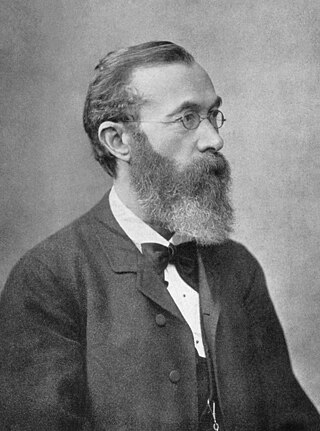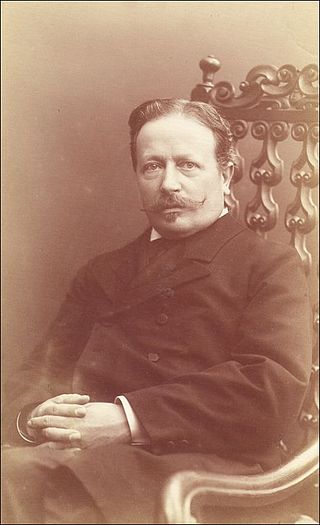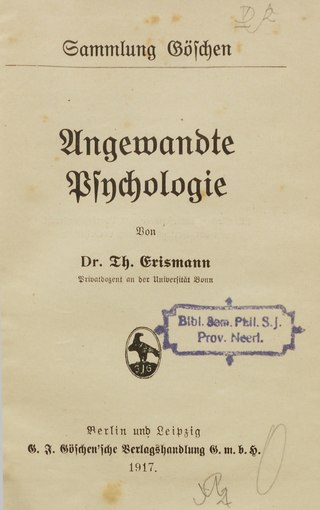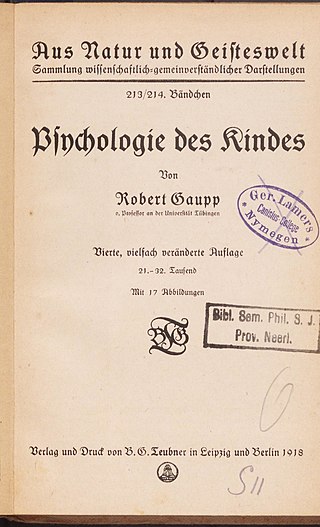
Wilhelm Maximilian Wundt was a German physiologist, philosopher, and professor, one of the fathers of modern psychology. Wundt, who distinguished psychology as a science from philosophy and biology, was the first person to call himself a psychologist.
Psychopathology is the study of mental illness. It includes the signs and symptoms of all mental disorders. The field includes abnormal cognition, maladaptive behavior, and experiences which differ according to social norms. This discipline is an in-depth look into symptoms, behaviors, causes, course, development, categorization, treatments, strategies, and more.
Psychology is defined as "the scientific study of behavior and mental processes". Philosophical interest in the human mind and behavior dates back to the ancient civilizations of Egypt, Persia, Greece, China, and India.
Eugène (Eugeniusz) Minkowski was a French psychiatrist of Jewish Polish origin, known for his incorporation of phenomenology into psychopathology and for exploring the notion of "lived time". A student of Eugen Bleuler, he was also associated with the work of Ludwig Binswanger and Henri Ey. He was influenced by phenomenological philosophy and the vitalistic philosophy of Henri Bergson, and by the phenomenologists Edmund Husserl and Max Scheler; therefore his work departed from classical medical and psychological models. He was a prolific author in several languages and regarded, as a great humanitarian. Minkowski accepted the phenomenological essence of schizophrenia as the "trouble générateur", which he thought consists in a loss of "vital contact with reality" and shows itself as autism.
Theodor Oswald Rudolph Külpe was a German structural psychologist of the late 19th and early 20th century. Külpe, who is lesser known than his German mentor, Wilhelm Wundt, revolutionized experimental psychology at his time. In his obituary, Aloys Fischer wrote that, “undoubtedly Külpe was the second founder of experimental psychology on German soil; for with every change of base he made it a requirement that an experimental laboratory should be provided.”

Karl Ludwig Kahlbaum was a German psychiatrist.

Otto Selz was a German psychologist from Munich, Bavaria, who formulated the first non-associationist theory of thinking, in 1913. Influenced by the German phenomenological tradition, Selz used the method of introspection, but unlike his predecessors, his theory developed without the use of images and associations. Wilhelm Wundt used the method of introspection in the 1880s, but thought that higher-level mental processes could not be studied in the scientific laboratory.

Georg Theodor Ziehen was a German neurologist and psychiatrist born in Frankfurt am Main. He was the son of noted author, Eduard Ziehen (1819–1884).
Jochen Fahrenberg is a German psychologist in the fields of Personality, psychophysiology and philosophy of science.

Erich Schröger is a German psychologist and neuroscientist.

Stephen W. Porges is an American psychologist. He is the Professor of Psychiatry at the University of North Carolina at Chapel Hill. Porges is also currently Director of the Kinsey Institute Traumatic Stress Research Consortium at Indiana University Bloomington, which studies trauma.

Karl Robert Sommer was a german psychiatrist and genealogist born in Grottkau. He is remembered for his work in experimental psychology. He coined the term „Psychohygiene“ in 1901 and founded the „German Association for Psychohygiene“ and the „Society for Experimental Psychology“. He is remembered for his work in experimental psychology. He also published on genealogy, philosophy, and forensics. He was also an active inventor and involved in local politics.
Völkerpsychologie is a method of psychology that was founded in the nineteenth century by the famous psychologist, Wilhelm Wundt. However, the term was first coined by post-Hegelian social philosophers Heymann Steinthal and Moritz Lazarus.
The Otto-Selz-Institute (OSI) is an interdisciplinary research institute at the University of Mannheim. It combines research, teaching and therapy.

Rainer Krause is a German psychologist, psychoanalyst and researcher of human emotions.
Hans-Ulrich Wittchen is a clinical psychologist, psychotherapist and epidemiologist. He has been a head of the Institute of Clinical Psychology and Psychotherapy and the Center of Clinical Epidemiology and Longitudinal Studies (CELOS) at the Technische Universität Dresden. Since 2018, he is leading the research group "Clinical Psychology and Psychotherapy Research" at the Psychiatric Clinic of Ludwig-Maximilians-Universität München and directs the IAP-TU Dresden GmbH in Dresden.

The book "Angewandte Psychologie", by the Swiss-Austrian psychologist and philosopher Theodor Paul Erismann, was published in 1917 in Berlin and Leipzig. It discusses major topics concerning school, work, law and their connections to psychology. The book aims at giving a short overview of how psychology can be applied to important areas in life. Erismann uses many applicable tests and describes them in great detail, thus providing a practical guideline on how to use the findings of psychology in different fields.
Ursula Hess is a German psychologist who teaches at the Humboldt-University of Berlin as Professor of Social and Organizational Psychology at the Department of Psychology.
Georg Ernst Anschütz was a German psychologist, who worked especially in the field of music psychology and synaesthesia. Due to his exposed role during the National Socialism period, he was dismissed from university service after 1945. His writings were nevertheless reprinted until the 1970s.

Psychologie des Kindes is a book written by the German psychiatrist and neurologist Robert Gaupp. It was first published in 1907 by the publishing house B.G. Teubner Leipzig Berlin. There were a total of four versions of the book, the last revised version appearing in print in 1917.












